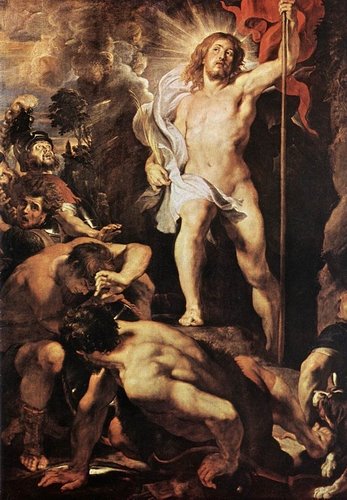 Franklin Graham's organization, Samaritan's Purse, is all about helping those in need. I have always been an admirer of Franklin Graham's ability to join consistent preaching of the gospel with an organizational concern for the poor and oppressed. It seems to me that such a thing enabled him to avoid the rather gnostic implications that are in play when we proclaim a gospel that is focussed mainly on 'saving souls' for 'eternal life' and not upon living the gospel bodily and socially here on earth. Thus his interviews this past week have been perplexing, even downright concerning.
Franklin Graham's organization, Samaritan's Purse, is all about helping those in need. I have always been an admirer of Franklin Graham's ability to join consistent preaching of the gospel with an organizational concern for the poor and oppressed. It seems to me that such a thing enabled him to avoid the rather gnostic implications that are in play when we proclaim a gospel that is focussed mainly on 'saving souls' for 'eternal life' and not upon living the gospel bodily and socially here on earth. Thus his interviews this past week have been perplexing, even downright concerning. I'm referring to the one with Sean Hannity in reference to the Easter interview with Christine Amanpour, but my main focus is his Christianity Today follow-up with Sarah Pulliam Bailey, since it is there that he defends his statements to his own evangelical folk. Here's a few excerpts from that interview, but by all means go and read them yourselves for fuller context.
Asked about his politics, even though he emphasized family values (defined in regard to abortion, homosexuality, and being 'good people'), Graham made it pretty clear that, for him, economic issues are right now the number one priority. The social action of the church is somewhat dependent on what it has available to give. Fair enough point, but is it really the case that the church's abilities depend on its economic prosperity, and does it matter how that prosperity is achieved? Does the economic system itself come under the confrontation of the gospel, or is it merely a neutral means for gospel proclamation and good deeds?
SPM: Before you go, I wanted to ask you about your comments about Donald Trump. You said, "The more you listen to him, the more you say to yourself, 'You know? Maybe the guy's right.'"
FG: Not on the birth [certificate] issue. I'm talking about the economic issues, how to get our country out of the economic mess we're in.... No question, the guy's got a lot of baggage. He owns casinos. He's had multiple marriages. He's got a lot of issues. No question he is a very smart guy. I did not endorse him. Christiane Amanpour asked me if he could be the right candidate. He could, under the right circumstances, but we're still not there yet.... We have to look at the policies, are they consistent with the teachings of Jesus Christ?...
If a person says that they're a Christian and then they have policies that are against what Christ teaches, that's a problem. There are candidates out there other than who we have talked about who are very good people who I could support. Mike Huckabee is a great man. He is a preacher. No question this man is saved.... You have Sarah Palin, who is a fine lady, who has great experience as governor, as a mayor, a very successful author, good family. Her husband is a man's man. He is one tough guy. Her kids are nice... You do have Mitt Romney.... He's a Mormon, but he is a smart business guy, a good man. Mormons have very strong families, and I appreciate that about him.
I'm not going to get involved in the political process. There will be people who I like and dislike. It's obvious the policies that are governing our country right now are not working.... Economic issues are issues that affect the church because if the country is not strong, we're not going to be able to support the mission work that we do. We're not going to be able to get involved in social concerns in the community. If we have more and more people out of work, it's going to affect the churches in a big way.
SPM: Are there times when a reporter asks you a question and you decide not to weigh in on it?
FG: Again, if someone asks me a question, I try to answer it. I was on MSNBC and they came after me. I decided that I'm going to see how many times I can get the gospel in. I think I got it in three times. Of course, they were attacking me. The most important message is that there's no one politician that's going to save America. The only hope that we have as a nation is if we repent of our sins.
To be more specific, for all his ability to make money, is Donald Trump really going to give the USA the economic policies that reflect Christian values? For all the legitimate concerns over how Obama has turned out, surely we don't see Donald Trump as more in line with the gospel?
It seems to me that Samaritan's Purse reminds us that the Christian gospel demands a self-sacrificial concern for the poor and oppressed both at home and broad. Certainly one can not legislate such self-giving sacrifice, but can one work for a country that does not legislate the opposite?
Franklin Graham knows that when he goes before an interviewer he is going to be pushed in the directions that they want to talk about. This is why I find it odd that he is willing to give them the sound-bytes they want, and in doing so to imply unquestioning support for the powers of capitalism just so that he can 'get the gospel in' a few times. It seems so counter-intuitive for a man who runs Samaritan's Purse. The only way I can make sense of it is if Graham sees the socio-economic system of the West as either morally neutral or gospel-consistent, thus making it an appropriate and relatively untouched tool in service of gospel proclamation and world mission.
I'm no economist, so maybe there are some arguments to be made there. But I'd like us to consider the contrast between Graham's words and those of Willie James Jennings' 2010 The Christian Imagination.

As my previous three posts on Jennings' book have indicated, I think it serves as an important reminder of the devastating ways that the church has harmed its witness by getting into bed with colonialist and capitalist impulses in the past. I see this book as something of a clarion call to a more socially appropriate enactment of the gospel in a world torn up by the divisions of race and greed. Hopefully by quoting at length from its final chapter I can illustrate the tension I'm seeing here between Graham's interview and the gospel he has heretofore been serving. Jennings writes:
I want Christians to recognize the grotesque nature of a social performance of Christianity that imagines Christian identity floating above land, landscape, animals, place, and space, leaving such realities to the machinations of capitalistic calculations and the commodity chains of private property.... Of course, our imaginations have been so conditioned by economically determined spatial strictures that .... imagining [change] is no small thing. Yet I am convinced that such a change is not only necessary but now stands before human communities as the only real option for survival in a world of dwindling natural resources and tightening global economic chains of commodification. To imagine along the direction I suggest in this book would be nothing less than a theological act, indeed, as I suggest, a Christian act of imagining. And if, as I believe, Christian life is indeed a way forward for the world, then it must reemerge as a compelling new invitation to life together....Indeed! And perhaps they are entirely unrealistic! Perhaps they can only be striven for in community's confessing Christ as Lord. Perhaps such communities can only seek this out within the limitations of their societies at large at cost to themselves -- doing so in the self-giving and cruciform love of Christ. Jennings himself concludes exactly this. This is the place where such a Christian imagination hits the ground and plods forward patiently.
Jesus entered fully into the kinship structure [of his time] not to destroy it but to reorder it -- around himself.... The kinship network in Israel would not be profoundly qualified. Jesus came first -- not husband or wife, not mother, father, sister, brothers, not familial obligations and demands, not cultural conventions, and not social responsibilities. If the strongest bonds of relationship were qualified through commitment of Jesus, then the entire socioeconomic and political structuring processes deeply woven inside these bonds came into qualified view and ultimately unrelenting challenge. Jesus drew a new communion together in Israel. This new communion carried of necessity the distinctive marks of his scandal....
[No doubt Jesus and the apostles expose] the tremendous challenge toward intimacy created by the presence of the Spirit of God.... [But if] the struggle toward cultural intimacy was not faced by the church as inherent to the gospel itself, despite the constant work of the Spirit to turn Israel and Gentile peoples toward one another, then over time the only other option was the emergence of a Christian segregationalist mentality....
Imagine a people defined by their cultural differences yet who turn their histories and cultural logics toward a new determination, a new social performance of identity.... This new cultural politic is a complex new configuration and social alliance and political allegiance bound up in life together with the many. The implications of this new space in which a new cultural politic emerges are breathtaking.(quoting pages 293-294, 263-264, 270-271, 273)
But what if Christians, instead of confessing that this 'can only be striven for', simply rest content with the status quo socio-political constructs? How can we be satisfed, even proud of ourselves, when we 'get the gospel in' to conversations that end up offering their support to the perpetuation of economical value systems which are (arguably) contrary to that gospel itself? This is at best a failure to take seriously the machinations of society and at worst a gnosticism of the gospel. Based on Franklin Graham's track record, I can't imagine he would want to support the latter, but given the politicization of everything American and the publicity such interviews garner, the trajectories recommended in these interviews is concerning.
Based on mainstream evangelicalism's zealous and immediate outcry against Rob Bell about his alleged break from the gospel, should we not expect even more concern about the misrepresentation of the gospel that has manifested itself so much more concretely and publicly here?
Correct me where I'm wrong? Push me in a healthier direction with this?





 There are a few others going down to York University (pictured here) from Aberdeen University and I must say that, though I don't mention them much on the blog, being around these theologians week after week has had the double benefit of (a) making me realize how much I have to learn and (b) helping me hopefully learn some of it. Beside theirs, other intriguing papers include:
There are a few others going down to York University (pictured here) from Aberdeen University and I must say that, though I don't mention them much on the blog, being around these theologians week after week has had the double benefit of (a) making me realize how much I have to learn and (b) helping me hopefully learn some of it. Beside theirs, other intriguing papers include:


